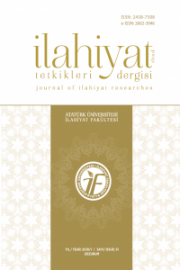İslâm Hukukunda Transseksüel veya Travesti Olmanın Hükmü
The Provision of Being Transsexual or Transvestite in Islamic Law
Author(s): Hilal ÖZAYSubject(s): Gender Studies, Law, Constitution, Jurisprudence, Islam studies, Sociology of Religion
Published by: Atatürk Üniversitesi İlahiyat Fakültesi
Keywords: Islamic law; transvestite/mukhanneth; transsexual/mukhanneth; hermaphrodite/intersex/khuntha; gay/homosexual;
Summary/Abstract: Humans have two distinct biological genders, male or female. In the society, according to these gender roles such as parents, husband and wife, daughter and son are undertaken. However, by putting forward various reasons, some reject the inherent biologically possessed gender and the role required by this gender, or become similar to the other gender, and aspire to the other gender. This trend leads to many problems and questions. People with such tendencies are called transsexual and transvestite. The subject of this work is the transsexual and transvestite judgment of Islamic law. In the study, because they are used in conjunction with these concepts, brief information about homosexual and hermaphrodite will also be given. At the end of the study, it was determined that the concepts of transsexual and transvestite were not mentioned in the classical Fiqh sources, but that the concepts of mukhanneth and mutarajjilah coincided with these concept in classical Fiqh books and that these people should be subject to provisions in line with their inherent gender. It was observed in classical fiqh books that khuntha has been mentioned in almost every subject and homosexual in the tazir and hadd topics, mukhanneth in the ta’zir, kazf, looking at women, ihtilat and imamate very briefly and that no provision was mentioned about mutarajjilah.
Journal: İlahiyat Tetkikleri Dergisi
- Issue Year: 2019
- Issue No: 51
- Page Range: 207-234
- Page Count: 28
- Language: Turkish

